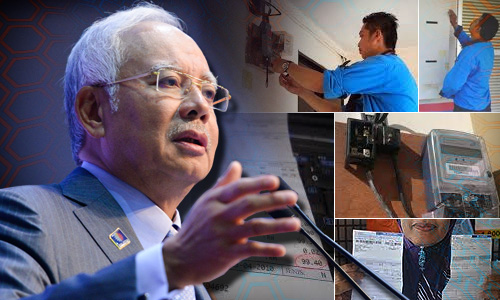
QUESTION TIME | On Tuesday, ahead of the Budget tomorrow, Prime Minister Najib Razak blogged his economic vision for Malaysia setting out 81 points, which among other things, claimed 1MDB will save Malaysia RM200 billion over the next 20 years.
That’s a rather outlandish claim - there were no calculations given. Is that really true? First, we need to reproduce point 63 in full which states:
“63. 1MDB in fact played a key role in solving the lopsided power agreements signed by a former leader. When 1MDB entered the industry, it was the lowest bidder in all its agreements, thus saving Malaysia RM200 billion over the next 20 years. One research house’s report about the revised power agreements was simply titled ‘No more sweetheart deals’”.
Ah yes, those lopsided power agreements - that’s true indeed. That former leader was indeed former prime minister Dr Mahathir Mohamad, now an opposition leader very keen to topple Najib, although Najib did not name him. And it was true that Mahathir gave out to the early independent power producers, or IPPs, rather lucrative contracts.
But did 1MDB start the process of more market-oriented pricing of power and reduce power costs by RM200 billion over 20 years? No, that’s not true. It started from before Najib’s time - even as far back as Mahathir’s time when it later realised the power deals were, yes, terribly lopsided in favour of the IPPs.
By the time 1MDB, which acquired Ananda Krishnan’s, Genting’s and the Negri Sembilan royal family’s power assets in a deal which overpriced them by as much as RM3 billion, came into the picture, power players were pretty much competing with one another to get IPP contracts, unlike the old days. Power was no longer that lucrative a business.
In fact, power players subsequently alleged that 1MDB was getting preferential treatment in new power plant-ups, with some projects awarded without any open tenders and some being awarded to 1MDB although other bids were more competitive!
So, to say or imply that 1MDB singlehandedly brought down power rates by RM200 billion over 20 years is by any stretch of the imagination stretching the truth to breaking point. To reinforce this, consider how much net profit Tenaga Nasional, the sole seller (with some exceptions) of power in Malaysia makes - RM7.37 billion in 2016.
If that is the case, since Tenaga Nasional has not adjusted tariffs downwards, can we expect that its profits will more than double, increasing by around RM10 billion a year shortly, making the company a “screaming buy” in the eyes and minds of investors? Of course not, because it’s not true.
Put it another way, Tenaga Nasional’s market value now is about RM80 billion, give or take some. If its profits increase by a cumulative RM200 billion over 20 years, shouldn’t its current market value double to about RM160 billion? Why is that not happening?
Future being pawned
To be fair, not all Najib’s claims are as far-fetched, and yes, there were some achievements during his time as prime minister from 2009, as were achievements during every one of the previous five prime ministers. But the question to ask is, how much of the achievements are directly due to Najib’s economic policies, or Najibnomics?
And couldn’t the achievements be a lot more if this government had good governance, is corruption-free, efficient, competent and looks after the interests of all the people in the country? And are some of the policies and revelations so drastic and injurious such that they seriously affect the future potential and well-being of the country?
So many questions remain unanswered over 1MDB. As much as RM40 billion could have been squandered. No one, not one person, has been brought to account in one of the biggest, if not the biggest, kleptocracy in the world. What does it presage for the future of the country? Where is Najib’s good and proper explanation on what happened at 1MDB, one that is believable?
What about all those lopsided contracts that Najib’s government is signing with China? Let’s take one example - the East Coast Rail link or ECRL. This RM55 billion project is considered terribly overpriced and unfeasible but is being built with Chinese financing, expertise and labour. There were no open tenders. Why?
China lends the money but promptly gets the construction contract too. It has cheap labour and cheap inputs - the actual cost to it will be much lower than RM55 billion. There is a grace period of seven years and then it gets paid back with interest. All indications are the project is unfeasible, so how will payment be made? With the profits? Will there be profits? By the time payment is made, Najib will not be in power, and may not be around.
The future is being pawned to a foreign country by irresponsible spending by a government which does not have the money to independently undertake this project. Is that responsible government, is that not a terribly lopsided deal, one that favours a foreign superpower keen to extend its hegemonic power throughout the region?
Yes, the ECRL will be a game changer but not in the way Najib says it will be. It will prove to among the most costly and wasteful of projects ever and it will put the government in debt for a long period of time. Liabilities will jump seven years after construction.
There are other criticisms that can be made against Najib’s vision but, in the interest of space, this will have to do for now. While there are some valid claims, others are half-truths and oversimplifications.
P GUNASEGARAM is starting to detest the word and concept of “vision” - Vision 2020, Najib’s Vision, TN50, etc. Let’s stop visualising and do something instead. E-mail: t.p.guna@gmail.com.- Mkini



No comments:
Post a Comment
Note: Only a member of this blog may post a comment.